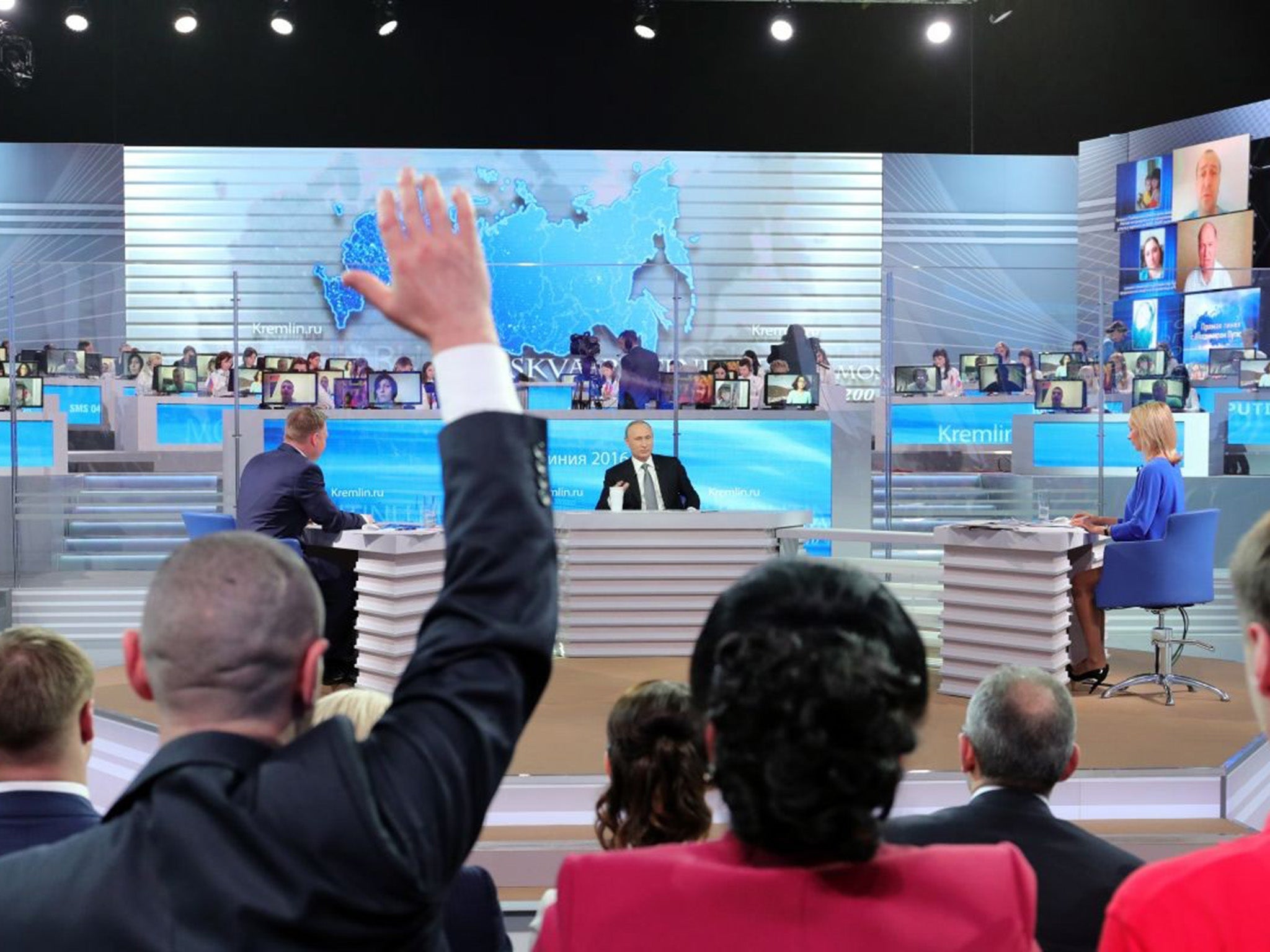Vladimir Putin annual Q&A: Girl asks Russian president who he would save from drowning first - Recep Tayyip Erdogan or Petro Poroshenko
The question came at an annual question and answer session with the Russian president

Your support helps us to tell the story
From reproductive rights to climate change to Big Tech, The Independent is on the ground when the story is developing. Whether it's investigating the financials of Elon Musk's pro-Trump PAC or producing our latest documentary, 'The A Word', which shines a light on the American women fighting for reproductive rights, we know how important it is to parse out the facts from the messaging.
At such a critical moment in US history, we need reporters on the ground. Your donation allows us to keep sending journalists to speak to both sides of the story.
The Independent is trusted by Americans across the entire political spectrum. And unlike many other quality news outlets, we choose not to lock Americans out of our reporting and analysis with paywalls. We believe quality journalism should be available to everyone, paid for by those who can afford it.
Your support makes all the difference.Vladimir Putin has been forced to dodge being forced to publically choose between his enemies after being probed on who he would save from drowning first by a 12-year-old girl in televised phone in.
Russians were able to call in with questions for their president on Thursday at the annual televised question and answer session.
The girl asked the president whether he would rescue Turkish President Recep Tayyip Erdogan or Ukrainian President Petro Poroshenko.
But Mr Putin kept his cards close to his chest, saying: "If someone has decided to drown, it’s probably already impossible to save them anyway.
"Though of course we are ready to reach out a helping hand to any of our partners, if they want it.”
He was also grilled on more light hearted topics - such as whether he liked porridge or when or if he is planning to remarry.
The event was used by the Kremlin as a way to shore up support ahead of a parliamentary election in September and to carefully monitor the regions for signs of unrest.
Mr Putin cast himself and the ruling United Russia party as an anchor of stability at a time when the economy is shrinking and the financial knock-on effects of Russia's stand-off with the West are still being felt.

With real incomes down and people worried about high food inflation, unpaid wages, and corrupt officials, Mr Putin adopted a father-of-the-nation stance, letting people know he understood that many, especially in the regions, were suffering but that economic growth would return next year.
Wrapping up the event after three hours and 40 minutes, Putin said he had heard a lot of impassioned questions from worried citizens.
"I share your concerns in nearly 100 per cent of cases," he said. "We'll work together so that your problems are relieved."
He also used it as an opportunity to dismiss critcism surrounding the leaks of the Panama papers last week.
He said media reports that billions of dollars in Panama offshore accounts might be linked to him were a US-backed "provocation".
The leak of confidential documents from a Panamanian law firm earlier this month has angered the Kremlin, forcing it to field questions about offshore accounts allegedly belonging to one of Mr Putin's best friends.
"They must understand that the issue is not about specific people, individuals, no matter what position they hold in Russia," Mr Putin said, after lashing out at US officials and US bank Goldman Sachs.
"The issue is about the country, which cannot be manipulated."
Mr Putin delivered a spirited defence of his friend Sergei Roldugin, who, according to reports based on the Panama Papers, has a business empire involved in offshore transactions that might be linked to the president.
"Who does it, these provocations? We know that there are some staff from official American institutions," said Mr Putin.
When asked whether he wanted Hillary Clinton or Donald Trump to triumph at the US Presidential election in November, Mr Putin said the individual in charge did not matter - it only mattered that Washington dropped its "imperial ambitions".
"It isn’t about specific people. If they maintain their false assumption of exceptionalism, then it means they will always demand a special place and special rights", he said.
Additional reporting by Reuters
Join our commenting forum
Join thought-provoking conversations, follow other Independent readers and see their replies
Comments